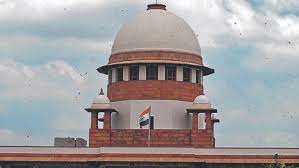This appeal has been preferred by the defendant no. 2 (Sachidhanandam) assailing the legality and validity of the judgment and decree passed by the High Court, allowing the regular second appeal in part, preferred by the plaintiff (Para 3)
Plaintiff’s suit for partition was allowed by the trial Court allotting her 1/8th share in the suit properties. On appeal by the defendant no. 2, the First Appellate Court allowed the appeal in part holding that the plaintiff/respondent no. 1 is entitled to 1/16th share in suit ‘B’ and ‘C1’ schedule properties. (Para 4)
The trial Court held that the defendants have not established the veracity of the Will dated 01.02.2000 executed by the deceased-1st defendant (Nagammal), therefore, they are not entitled to claim the rights in respect of the properties mentioned in the Will. (Para 8)
However, in view of the provisions contained in Sections 15 (1)(a) and 16 of the Hindu Succession Act, 1956[(for short, ‘the Act’)] , the High Court is not correct in allotting 1/16th share to the plaintiff out of the share of her mother-in-law in the ‘B’, ‘C’ and ‘C1” schedule properties. (Para 10)
Sections 15 and 16 of the Act provide that the property of a female Hindu dying intestate shall devolve according to the rules set out in Section 16. Section 15(1)(a) provides that such devolution shall be firstly, upon the sons and daughters (including the children of any pre-deceased son or daughter) and the husband. The rule for distribution of the intestate property of a female Hindu and order of succession is provided under Section 16 of the Act according to which, the order of succession among the heirs of a female Hindu referred to in Section 15 shall be firstly, as per rule 1 thereof, among the heirs specified in sub-section (1) of Section 15 of the Act. (Para 12)
A combined reading of Section 15(1)(a) and Section 16 of the Act would make it manifest that the property of a female Hindu dying intestate shall devolve, firstly, upon the sons and daughters (including the children of any pre-deceased son or daughter) and the husband. (Para 13)
SUPREME COURT OF INDIA
2023 STPL(Web) 409 SC
[2023 INSC 984]
Sachidhanandam Since Dead Through His Lrs Vs. E. Vanaja And Ors
Civil Appeal No. 3667 of 2018 With Civil Appeal No(S). of 2023 @ Slp(C) No(S). @ Diary No(S). 7823 Of 2018.-Decided on 06-11-2023.
https://stpllaw.in/wp-content/uploads/2023/11/2023-STPLWeb-409-SC.pdf







